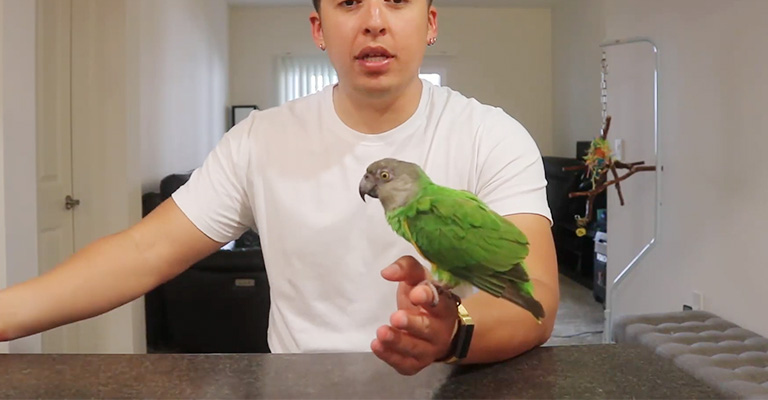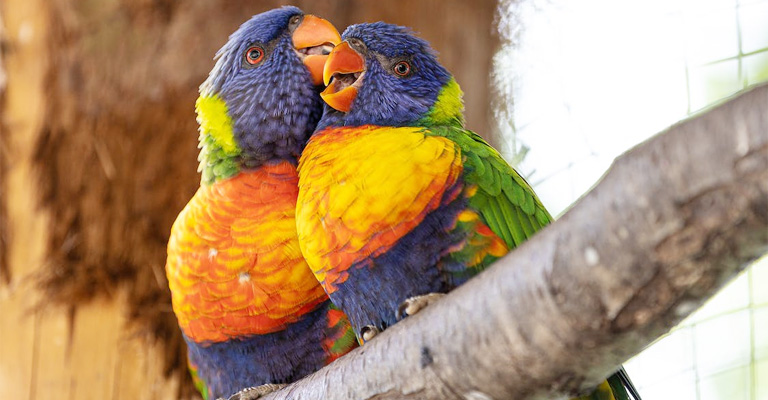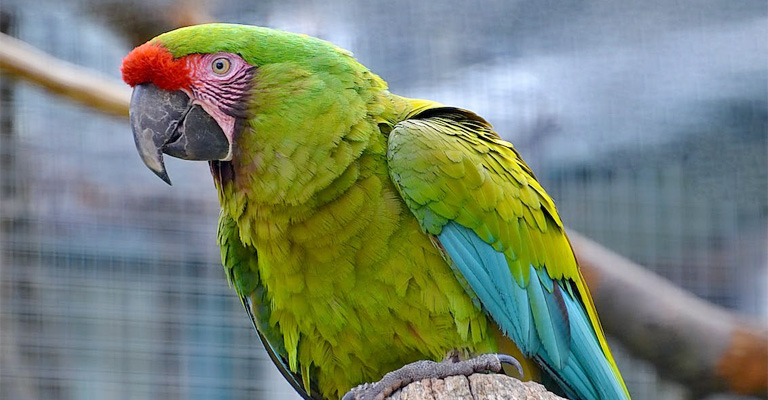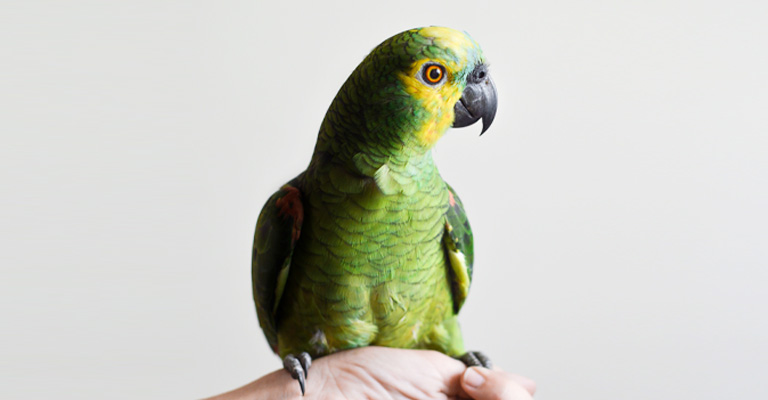Living with a pet bird can be a rewarding experience, but it also comes with its unique challenges. One common issue that bird owners face is excessive screaming. While birds are naturally vocal creatures, incessant screaming can be disruptive and stressful for both the bird and its human companions.
The good news is that with the right knowledge and strategies, you can help your feathered friend find their voice without overwhelming your household. In this blog post, we’ll explore effective ways to answer ‘How to stop your pet bird from screaming?’.
From identifying the underlying causes to implementing positive reinforcement techniques and providing the right environment, we’ll cover the steps you can take to create a harmonious and peaceful coexistence with your avian companion.

Bird’s Behavior Regarding Screaming
Birds scream or vocalize for various reasons. In the wild, it’s primarily a means of communication. They use screams to establish territory, warn of danger, attract mates, or convey distress.
Some species, like parrots and cockatoos, are more prone to loud vocalizations, often as a form of social interaction or mimicry. In captivity, birds may scream due to boredom, loneliness, or stress, seeking attention or expressing frustration.
Providing mental stimulation through toys, social interaction, and a consistent routine can help reduce excessive screaming. It’s crucial to understand a bird’s specific needs and species traits to address screaming effectively.
Seek advice from avian experts if needed, as addressing screaming behavior requires patience and a tailored approach to ensure the well-being of these intelligent creatures.
Why Do Birds Scream Now and Then?
Birds may scream or vocalize periodically for various reasons, including:
Communication
Birds use vocalizations to communicate with each other. They may scream to establish territory boundaries, warn of potential dangers, or communicate within their flock or family group.
Mating and Attraction
During the breeding season, many bird species engage in vocal displays to attract mates. Males may sing or call loudly to advertise their presence and fitness to potential partners.
Social Interaction
In some bird species, vocalizations are a form of social interaction. They use calls and screams to maintain contact with other members of their group, reinforcing social bonds.
Food Acquisition
Some birds may vocalize when they find food to alert other birds to the presence of a food source. This behavior can be observed in birds like crows and gulls.
Threat Response
When birds perceive a threat, they may scream as an alarm call to warn others in the area. This behavior helps the group stay vigilant and safe from predators.
Environmental Factors
Changes in weather, atmospheric pressure, or other environmental factors can influence bird behavior, including vocalizations. Birds may be more vocal before a storm, for example.
Stress or Discomfort
In captivity, birds may scream if they are stressed, bored, or uncomfortable. This can be a way of seeking attention or expressing their dissatisfaction with their environment or circumstances.
Individual Personality
Just like humans, individual birds have unique personalities. Some birds may be naturally more vocal or prone to screaming than others.
The specific context and species of the bird are essential for interpreting why they are screaming. It’s also important to note that occasional vocalizations are a normal part of a bird’s behavior, and not all screaming is problematic.
Recognizing Different Types of Screams

Recognizing different types of screams in birds can provide valuable insights into their behavior and needs. Here are some common types of bird screams and their potential meanings:
Alarm Calls
These are sharp, loud screams or calls that birds use to alert others to potential threats. Alarm calls are often short and repetitive. Birds will scream like this when they perceive a predator nearby, signaling to the flock or group to take cover.
Territorial Calls
Some birds scream to establish and defend their territory. These calls are typically repetitive and may be directed at intruding birds of the same species or used to deter other potential competitors.
Mating Calls
During the breeding season, male birds may produce distinctive, melodious calls or songs to attract females. These calls are often complex and musical and are designed to impress potential mates.
Contact Calls
Birds use contact calls to maintain communication with members of their group or family. These calls are softer and less intense than alarm calls and serve to keep the group together.
Food Calls
Birds may scream or call when they discover a food source. This can serve as an invitation to other birds to join in on the feeding opportunity.
Stress Calls
When birds are stressed, uncomfortable, or in pain, they may produce high-pitched or frantic screams. These calls can indicate that something is wrong and require attention from their caretakers.
Loneliness or Attention-Seeking Calls
In captivity, birds may scream if they feel lonely or bored. These calls are often persistent and are an attempt to engage with their human caregivers or other birds.
Mimicry Calls
Some species, like parrots, are known for their ability to mimic sounds, including human speech and environmental noises. These mimicry calls are a form of social interaction and entertainment.
Recognizing the specific context and the bird’s behavior alongside the type of scream is crucial for understanding its meaning. Bird owners and enthusiasts should pay close attention to their birds’ vocalizations to meet their physical and emotional needs effectively.
How to Stop Your Pet Bird from Screaming

Addressing excessive screaming in pet birds requires a patient and tailored approach. Here are some strategies to help reduce and manage your pet bird’s screaming behavior:
Identify the Cause
Understand the reason behind your bird’s screaming. Is it due to boredom, loneliness, stress, or a medical issue? Identifying the cause is the first step in addressing the problem effectively.
Provide Mental Stimulation
Birds are intelligent and require mental stimulation. Offer a variety of toys, puzzles, and activities to keep your bird engaged. Rotate toys regularly to prevent boredom.
Social Interaction
Spend quality time with your bird daily. Birds are social animals and need interaction with their human caregivers. Talk to them, sing, or engage in gentle play.
Routine and Consistency
Establish a consistent daily routine for your bird. Birds thrive on predictability, and a routine can help reduce anxiety and screaming.
Diet and Nutrition
Ensure your bird’s diet is balanced and nutritious. Consult with an avian veterinarian to determine the best diet for your specific bird species.
Environmental Enrichment
Create an enriching environment with perches, swings, and foraging opportunities. Mimic their natural habitat as closely as possible.
Training and Positive Reinforcement
Train your bird using positive reinforcement techniques. Reward quiet or desired behaviors with treats and praise. Ignore excessive screaming to avoid inadvertently reinforcing it.
Quiet Time
Provide your bird with a quiet and dimly lit space for rest. Birds need adequate sleep, and disturbances can lead to increased vocalizations.
Health Check
Schedule regular check-ups with an avian veterinarian to rule out any underlying health issues that may be causing discomfort or pain.
Consult an Expert
If the screaming persists or worsens despite your efforts, consider seeking guidance from an avian behaviorist or trainer who specializes in bird behavior. They can provide personalized advice and training techniques.
Use Background Noise
Playing soft music, using white noise machines, or having a radio on at a low volume can help mask external noises that might trigger your bird’s screaming.
Be Patient
Behavior changes take time, and it’s essential to be patient and consistent with your efforts. Avoid punitive measures, as these can stress your bird further.
Remember that some level of vocalization is natural for birds, and complete silence is not realistic. The goal is to reduce excessive and disruptive screaming while ensuring your bird’s physical and emotional well-being.
Each bird is unique, so it may take some trial and error to find the most effective strategies for your specific pet bird.
Additional Tips to Calm Down Your Bird

In addition to addressing excessive screaming, here are some additional tips to help calm down your pet bird and create a harmonious environment:
Provide a Safe Retreat
Offer your bird a cozy, covered cage or nest box where they can retreat when they need some quiet and privacy. Birds often feel safer in enclosed spaces.
Gentle Handling
Handle your bird gently and calmly. Avoid sudden movements or loud noises when interacting with them, as this can cause stress.
Bathing
Many birds enjoy bathing. Offer a shallow dish of water for your bird to splash around in. Regular baths can help keep feathers clean and reduce anxiety.
Playtime and Foraging
Engage your bird in interactive play sessions and foraging activities. These can mentally stimulate them and provide a positive outlet for their energy.
Positive Socialization
Introduce your bird to new people, pets, and experiences gradually and positively. Socialization can help reduce fear and anxiety.
Training and Trick Training
Teach your bird new tricks or commands using positive reinforcement techniques. This can be mentally stimulating and strengthen the bond between you and your bird.
Aromatherapy
Some birds may benefit from calming scents like lavender or chamomile. Use a bird-safe diffuser or place dried herbs in their cage, but ensure it doesn’t overwhelm them.
Adjust Cage Location
Place your bird’s cage in a quieter area of your home, away from loud household activities or high-traffic areas.
Provide Companionship
Consider getting another bird of the same species if your bird is particularly social. However, be cautious, as introducing new birds can be challenging and may not always lead to reduced screaming.
Natural Sunlight
Ensure your bird gets exposure to natural sunlight or provide full-spectrum lighting to mimic the benefits of natural sunlight. This supports their overall health and well-being.
Consult with an Avian Behaviorist
If your bird’s behavior is complex or challenging to manage, seek the expertise of an avian behaviorist who can assess your bird’s unique needs and offer tailored guidance.
Patience and Understanding
Building a strong bond with your bird takes time and patience. Understand their individual personality and preferences, and be empathetic to their needs.
Remember that it’s essential to be observant and responsive to your bird’s cues and body language. Tailor your approach based on their individual temperament and needs, and always prioritize their well-being and comfort.
When to Seek Professional Help?
Seeking professional help for your pet bird is crucial when you encounter certain situations or behaviors that you cannot effectively address on your own. Here are some signs that it may be time to consult with a veterinarian or avian behaviorist:
Persistent Excessive Screaming
If your bird’s screaming continues despite your efforts to address it using positive reinforcement and environmental enrichment, professional guidance may be needed to determine the underlying cause.
Sudden Behavioral Changes
Abrupt changes in your bird’s behavior, such as increased aggression, feather plucking, or self-mutilation, may indicate a health issue or severe stress and should be examined by a veterinarian.
Weight Loss or Health Issues
If your bird is losing weight, experiencing changes in appetite, or showing signs of illness (e.g., discharge from the eyes or nostrils, labored breathing, unusual droppings), consult with an avian veterinarian promptly.
Injury
In case of an accident or injury, including broken wings or legs, bleeding, or open wounds, seek immediate veterinary care. Delays can worsen the condition.
Respiratory Distress
If your bird exhibits signs of respiratory distress, such as rapid or labored breathing, wheezing, or coughing, consult with a veterinarian immediately.
Reproductive Issues
Female birds may experience egg-laying difficulties, such as being unable to pass an egg. This is a medical emergency and requires immediate attention.
Loss of Balance or Coordination
If your bird suddenly loses its balance, falls frequently, or displays signs of neurological issues, consult with a veterinarian to rule out underlying health problems.
Persistent Fear or Aggression
If your bird is constantly fearful, excessively aggressive, or is showing signs of phobias that disrupt their quality of life, an avian behaviorist can help assess and address these issues.
Prolonged Grief or Depression
Birds can experience grief and depression when they lose a companion or face significant changes in their environment. If your bird’s emotional state does not improve over time, seek professional advice.
Breeding and Nesting Issues
Breeding birds may encounter complications during egg-laying or parenting. Seek guidance from an avian veterinarian or experienced breeder if you notice problems in the breeding process.
Chronic or Recurrent Health Problems
If your bird suffers from recurrent health issues or chronic conditions, work closely with an avian veterinarian to develop a long-term care plan.
When seeking professional help, it’s essential to choose a veterinarian with experience in avian medicine or, for behavioral issues, an avian behaviorist or trainer who specializes in bird behavior.
FAQs
Birds scream for various reasons, including communication, boredom, stress, or seeking attention. Identifying the cause is essential to address the behavior effectively.
Avoid punishment as it can increase stress and worsen screaming. Instead, use positive reinforcement to reward quiet behavior and provide mental stimulation.
If excessive screaming continues, consult with an avian behaviorist or veterinarian to assess underlying issues, develop a tailored plan, and ensure your bird’s well-being.
Complete silence is unrealistic, as birds naturally vocalize. The goal is to reduce excessive or disruptive screaming while meeting your bird’s physical and emotional needs.
While some birds benefit from companionship, introducing a new bird should be carefully considered, as it may not always lead to reduced screaming. Consult with an avian expert for guidance before adding a new bird to the household.
Wrapping Up
Remember, a harmonious relationship with your pet bird is achievable. By understanding the reasons behind their screaming and implementing the strategies discussed in this blog post, you can create an environment where your feathered friend feels content.
Also, both of you can enjoy each other’s company. Patience, consistency, and empathy are key in helping your pet bird find a balanced and happy life in your care.
Your commitment to their well-being will not only reduce their stress but also enhance the bond you share. Thank you for your support.